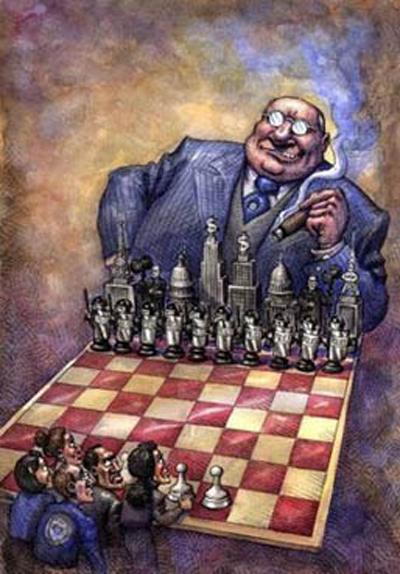JS Kim
 Despite the fact that nearly all of the macroeconomic trends I have predicted since 2006 on my blog, the Underground Investor, have come true, the percent of people that disagree with my predictions for 2010 and 2011 still outnumber those that agree by a factor of ten to one. There is a rational explanation why the public still grants a great deal of validity to the opinions of people I like to call the "men who cried wolf" - Ben Bernanke, Timothy Geitner, Gordon Brown, Alan Greenspan, et al.
Despite the fact that nearly all of the macroeconomic trends I have predicted since 2006 on my blog, the Underground Investor, have come true, the percent of people that disagree with my predictions for 2010 and 2011 still outnumber those that agree by a factor of ten to one. There is a rational explanation why the public still grants a great deal of validity to the opinions of people I like to call the "men who cried wolf" - Ben Bernanke, Timothy Geitner, Gordon Brown, Alan Greenspan, et al.
The explanation is that the fastest growing export of the Western banking industry is fraud. This is not to say that the eastern banking industry is not guilty of this same fraud. Off the top of my head and from what I have see in my travels through Asia, I can think of at least three real estate markets in the Pacific Rim region that are bubbles waiting to burst - New Zealand, Thailand, and Hong Kong. If you study the Central Banking monetary policies in these countries in recent years, you will discover that these real estate bubbles are the architectural accomplishments of their respective Central Banks as well. However, the roots of this global monetary crisis lie with the most influential Central Banks in the world that include the ECB, the Bank of England and the US Federal Reserve.
More than a year ago, I penned an article on my blog titled "The Line that Separates Real Money from Counterfeit Money Has Become Nearly Indistinguishable". In this article, I discussed the enormous irony of a viral story back then about the harm inflicted upon society from an inordinate amount of counterfeit £1 coins that were discovered to be in circulation in the UK. In that article, I stated the following:
"The Bank of England is not the only Central Bank to conclude that running the printing presses overtime to pull their domestic economies out of trouble is the preferred solution even though this "solution" will have some serious blowback consequences in the future. The Bank of Japan, the European Central Bank and the US Federal Reserve have all demonstrated a proclivity towards massive expansions of the monetary base, an action that will eventually lead to massive expansions in monetary supply and an ultimate race to the bottom in currency debasement. So with Central Banks literally taking actions that will eventually destroy the purchasing power of all major currencies, it is no stretch of the imagination to conclude that the "real money" they are currently printing will soon have far more deleterious effects on the purchasing power of said money than the comparatively small percentages of "counterfeit money" that leak into the system."
A couple of weeks ago, the UK Financial Times reported an article titled, "Our World Balances on a Sea of Debt". The byline of this article reads, "The banks that control the world’s supply of money are no better than counterfeiters - and their system of juggling debt has left the global economy teetering on the brink of ruin. Convicted fraudster Darius Guppy offers a provocative personal view." In this article, a must read in my opinion, Mr. Guppy argues:
"These ‘experts’ will tell you that the present difficulties are simply the result of abuses and excesses in a system that is basically sound. All that is required is for some faults to be corrected. Do not believe them. The reality is that the problem is systemic and a little tinkering here or there will achieve nothing in the long term. What is needed is a root-and-branch re‑evaluation of that most curious of cultural inventions, money: how it is created, how it circulates, and how it can best be used to serve the interests of the community."
This is a powerful statement that should lead the majority of the world’s citizens to engage in some serious introspection. There is more truth in that statement than any statement I’ve heard in the last decade issued by any global banker, politician, or the latest Nobel-prize winning economist with whom the media is enamored. If you take the time to understand how money is created, how it circulates, and how it can best be used to serve the interests of the community, I guarantee you will immediately question the integrity of every derivative of our monetary system from carbon credits and taxes to mortgages to credit cards. If a convicted felon understands more about how our monetary system operates than 99% of all Congressman and even Nobel laureates in economics, let alone the common citizen, then we need to not only question why this is, but we also need to ask the following question:
"Who controls [aka manufactures] the flow of information so expertly that we now have a grotesque imbalance between the understanding of reality and the acceptance of fantasy?"
Consider the immediate dire consequences of what would happen in America if the US government increased the capital requirements of the top 10 US banks tomorrow. Since all of these banking stocks have been manipulated higher over the last 9 months and are severely overvalued, raising new capital through secondary offerings would largely be an non-viable pursuit. Thus, many of these banks would have to resort to selling portions of their commercial real estate portfolio to raise the capital to meet increased capital requirements. If so, then true discovery of the real values, not the marked-to-fantasy values, of commercial real estate in the United States would occur. And there is no doubt that true discovery of commercial real estate portfolios held by US banks would have massive negative consequences upon financial stocks, then US stock market indexes, and then global stock markets. But why should true discovery of asset values cause such massive disruption worldwide? Could it be because fraud is upholding many asset valuations today?
What is occurring in the US commercial real estate industry would be akin to the following example. In 2008, when the S&P 500 plummeted by nearly 40%, imagine if you knew that every single commercial investment house that was a competitor of the one that managed your money lost roughly 40% in all of their managed stock portfolios that year as well. Now, imagine your surprise when you received a statement at the end of 2008 from your commercial investment firm sometime in early 2009 in which your portfolio, valued at $2 million at the beginning of 2008, was still valued at $1.95 million. Wondering how your firm managed to outperform all their rivals when you know full well that they all employ the exact same diversification strategies, you phone your advisor to acquire about this anomaly.
Not a minute into your conversation, your advisor stops you mid-sentence and states, "We achieved such exceptional performance because our internal valuation models have determined that the true valuation of your portfolio should be $1.95 million. Furthermore, January 2008 was a really bad month so we excluded that month in our internal valuation models and amended our year to run from February 2008 to February 2009." Confused by this response, you respond: "Your internal valuation models? Does that mean if I wanted to cash out my portfolio right now, I would not receive $1.95 million less your commission fees?" Your advisor responds, "That is correct. Were you to cash out today, you may only receive $1.2 million, maybe even $1 million, not $1.95 million. But don’t worry, our internal valuation models have determined that the vast majority of stocks you hold are severely undervalued and that the market is not setting a fair price for your stocks were you to sell today. Our internal stock market valuation experts have told us that the true value of your portfolio is actually $1.95 million. That is why your statement shows your portfolio to be $1.95 million."
How would you react to this conversation? Most likely, you would scream fraud and pull your account immediately, right? But this is the scenario that is occurring with the commercial real estate sector in the US today, and this is precisely why banks that are insolvent are declaring themselves solvent. However, this example only illustrates one of a plethora of fraudulent reporting practices of governments and banks today. Changing reporting periods, definitions of bad expense, and altering calculations of Tier 1 capital (as exposed here by Zero Hedge in their article "Is Wells Operating Below The FDIC Statutory Minimum 3.0% Tier 1 Capital To Total Assets Ratio Courtesy Of A Few Accounting Gimmicks?") is now so commonplace that indeed, fraud is, without doubt, the number one export of Western banks today.
Politicians and bankers would do well to head the more than 200-year old words of Patrick Henry in his infamous "Give me liberty of give me death" speech:
"Mr. President, it is natural to man to indulge in the illusions of hope. We are apt to shut our eyes against a painful truth, and listen to the song of that siren till she transforms us into beasts. Is this the part of wise men, engaged in a great and arduous struggle for liberty? Are we disposed to be of the number of those who, having eyes, see not, and, having ears, hear not, the things which so nearly concern their temporal salvation? For my part, whatever anguish of spirit it may cost, I am willing to know the whole truth; to know the worst, and to provide for it."
Today, if politicians and bankers merely channeled the same amount of energy that they expend in deceiving the people into fixing the monetary system, then perhaps they would have already come up with a viable solution by now. mover But fraud, and perpetuation of an illusion seems to be their only concern today. And with good reason. As illustrated by a recent Center on Budget and Policy Priorities study, they are the only ones benefiting from this fraud. From 2002 to 2007, the top 1% of Americans captured nearly 70% of the income gains in America. Today, in my opinion, today, the number one reason why the vast majority of people still cannot except the possibility that we will soon enter into a second phase of this global economic crisis that will prove to be far worse than the financial disruptions we experienced in 2008 is the following: Most people alive today have no memory of the Great Depression. For those that do, certainly they are able to identify with much greater clarity, the similarities in the patterns of fraud back then and the patterns of fraud occurring today.
There was a reason why Pol Pot, the tyrannical Cambodian despot that murdered more than 1 out of every 5 adults in Cambodia, began his cleansing process by murdering the elderly and the literate. He literally wanted to wipe out his country’s memory of the past so he could create a new history that started with his tyrannical reign. The greatest advantage bankers and politicians have in continuing to perpetuate fraud today in America is the fact that there are very few people still alive that recall the Great Depression. If you have a grandmother or grandfather still alive that lived through the Great Depression, ask them about what happened back then and the similarities to what is happening today and I guarantee you that your eyes will be opened to a much greater extent than they are today. If this is not feasible, then find someone that lived through the economic collapse in Argentina, Poland or Russia and that now lives in your country and ask him or her for their perspective on what is going on today. I assure you that the response you hear will be truly enlightening.
In conclusion, even though grassroots movements such as Move Your Money and Sound Money Now! have admirable goals, true change cannot be achieved unless we restore our monetary system to a sound, honest system.
 I'm J.S. Kim, the founder of SmartKnowledgeU™ and the evolutionary MoneyPing™ investment strategies.
I'm J.S. Kim, the founder of SmartKnowledgeU™ and the evolutionary MoneyPing™ investment strategies.
SmartKnowledgeU™, LLC was founded on a simple bet I made with a friend many years ago that believed I couldn't outperform the best money managers on Wall Street. Well that year, my stock portfolio (with all long positions, and no options) returned 40% while the major index in the U.S. returned 6% over that same time period. In winning the bet, I employed some very untraditional strategies that I believed were the best ways to invest money, though the mainstream investment firms most assuredly would have disagreed with me. In fact, because my methods utilized strategies that greatly diminished the risks associated with the uncertainties of investing, they increased the probability of achieving financial freedom in a shorter timespan than traditional methods of investing. When I realized that these strategies would work repeatedly over time to produce consistent significant returns, it was at this point that I decided to establish SmartKnowledgeU™, LLC. Today, my consistent if not spectacular track record of predicting the various steps of this crisis since 2006 has attracted the attention of Reuters online, Gata.org, Google finance, Yahoo finance, Seeking Alpha, Wikinvest, the Financial Times, and others, as all of these sites have re-printed articles I have written on my investment blog, the Underground Investor.
A quick note about our corporate logo as sometimes we've received confused inquiries as to its meaning. My company chose to alter the meaning of the "all-seeing eye" by placing a keyhole inside the pupil. The keyhole indicates that our company's mission is to reveal to our clients, in clear and precise terms, the true origins of this crisis (as opposed to the reasons disseminated by the mass media). Thus, by granting our clients the symbolic "key" to knowledge that the financial oligarchs wish to keep secret, we will ensure that our clients not only position themselves appropriately for this growing monetary crisis but also profit from this crisis. The fact that we have guided our clients to ignore government officials and Wall Street CEOs that have continually lied about this crisis for more than two years is proven by our track record of performance since our company's founding in 2006.
www.smartknowledgeu.com
 Eileen Danneman ha scoperto un documento che indica che Kathleen Sebelius, la segretaria dei Servizi Sanitari e Umanitari Americani, US Health and Human Services, il 5 marzo 2010 ha esteso l'emergenza pandemia al 2012 e questo nella scarsa attenzione, o del tutto assente, dei media.
Eileen Danneman ha scoperto un documento che indica che Kathleen Sebelius, la segretaria dei Servizi Sanitari e Umanitari Americani, US Health and Human Services, il 5 marzo 2010 ha esteso l'emergenza pandemia al 2012 e questo nella scarsa attenzione, o del tutto assente, dei media.


 LONDRA - "Il mondo ha globalizzato l'economia ma ora deve globalizzare anche la politica, se vuole evitare il ripetersi di una grande recessione come quella degli ultimi due anni. E io mi batterò per questo". Battagliero e fiducioso, Gordon Brown entra nella volata finale della campagna elettorale con la speranza di conservare il posto: i sondaggi lo danno in rimonta sui conservatori, si moltiplicano le previsioni che, sebbene di un soffio, seppure solo formando un governo di coalizione con i liberal-democratici, il 59enne primo ministro laburista potrebbe uscire vincitore dal voto del 6 maggio prossimo. Subentrato nel 2007 a Tony Blair dopo un decennio come ministro del Tesoro, ripetutamente criticato per lo scarso carisma e il carattere irascibile, Brown recupera consensi perché la gente sembra fidarsi più di lui, per affrontare le insidie dell'economia, che dei conservatori rinnovati da David Cameron. "Non deluderò chi crede in me", promette il premier in questo incontro con la stampa organizzato dalla Thompson Reuters Newsmaker.
Signor primo ministro, ci sono errori che si rimprovera nei lunghi anni trascorsi al governo? E quale è stato il più grande?
"Mostratemi un soldato che non ha commesso errori, disse Churchill, e vi mostrerò un soldato che non ha combattuto alcuna battaglia. Dunque certo che ne ho fatti anch'io. Quello che più mi rimprovero è non avere costruito un coordinamento economico mondiale, a fine anni Novanta, dopo la crisi scoppiata nei paesi asiatici, campanello d'allarme di quello che è avvenuto nell'ultimo biennio a livello globale. Non potevo farlo da solo, ma dalla mia postazione di ministro del Tesoro britannico partecipai a numerose riunioni per creare una struttura mondiale in grado di arginare il collasso dell'economia. Però non lo facemmo, non facemmo abbastanza, in ogni caso non ci riuscimmo".
E che lezioni ha tratto da quell'errore?
"Che il mondo ha globalizzato l'economia, ma ora deve globalizzare anche la politica. Occorre creare un coordinamento globale a ogni livello, perché i problemi non sono più nazionali ma internazionali. Occorre una supervisione globale non solo dell'economia, ma per la proliferazione nucleare, il cambiamento climatico, il terrorismo e la sicurezza. Il ritmo della globalizzazione richiede in ogni campo risposte globali".
Si candida lei a trovarle, le risposte globali?
"Sono stato tra i primi a battermi per una risposta globale alla crisi finanziaria ed economica degli ultimi due anni, e la risposta coordinata del G20, ovvero dei paesi che rappresentano l'80 per cento dell'economia mondiale, è servita ad arginare il problema. Ora ci stiamo muovendo, sempre a livello del G20, in vista del summit di giugno, per promuovere una regulation globale dell'economica che ci metta al riparo dal ripetersi degli eccessi che hanno provocato questa crisi. È un'iniziativa in cui credo fermamente e continuerò a battermi per portarla avanti".
Negli ultimi tempi lei è stato pesantemente criticato per il suo carattere. Pensa di avere una personalità migliore di David Cameron?
"Sta agli elettori giudicare. Alcuni dicono che le prossime elezioni saranno decise dal carattere dei due candidati. Altri dicono che saranno decisivi i nostri programmi. Per me, carattere e programma sono una cosa sola. Gli elettori devono chiedersi se vogliono un leader che dice quello che è necessario dire, non quello che alla gente piace sentire. Un leader che vuole ridurre il deficit, ma senza togliere il sostegno a un'economia che rischia altrimenti di ricadere nella recessione da cui è appena uscita. Un leader che vuole una Gran Bretagna decisa a giocare un ruolo attivo in Europa, e non propensa a richiudersi su se stessa".
I sondaggi ipotizzano che dalle urne esca un "hung parliament", in cui né voi né i conservatori avrete la maggioranza assoluta, ma in cui il suo Labour potrebbe governare in una coalizione con il terzo partito britannico, i liberal-democratici. Sarebbe disposto a formare un'alleanza con loro?
"Risponderò a questa domanda, se sarà necessaria, tra un paio di mesi. Per adesso, dico che spero e credo che il partito laburista possa vincere e governare da solo, come è ovvio che dica qualsiasi partito in campagna elettorale. Mi dispiace, ma per ora non posso rispondere diversamente".
Visto che ci incontriamo nella City, continuerà a sostenere e a proteggere Londra come capitale della finanza mondiale?
"Assolutamente sì, perché è uno dei punti di forza della nostra economia. Ne ricaviamo grandi vantaggi. Ed è un ruolo che solo noi, insieme a New York, possiamo svolgere, per la lingua inglese che è la lingua globale, per una legislazione che è un punto di riferimento internazionale in materia finanziaria, per gli alti standard di affidabilità, per la competitività e la libertà. Al tempo stesso, stiamo lavorando affinché anche altri settori della nostra economia si risollevino e giochino un ruolo importante in futuro. Per questo stiamo facendo grandi investimenti nel settore del digitale, delle biotecnologie, dell'energia sostenibile".
Signor primo ministro, la crisi economica è davvero superata?
"Il peggio della bufera è passata. Ma restano nubi sulla strada per uscirne. Ci saranno altri incidenti di percorso. Ma a mio parere siamo a un punto di svolta, sia sulla via della ripresa interna britannica, sia su quella della governance globale. Per questo dico che le prossime elezioni, qui nel Regno Unito, saranno le prime elezioni dell'era globale. E io sono qui per vincerle. Non deluderò".
LONDRA - "Il mondo ha globalizzato l'economia ma ora deve globalizzare anche la politica, se vuole evitare il ripetersi di una grande recessione come quella degli ultimi due anni. E io mi batterò per questo". Battagliero e fiducioso, Gordon Brown entra nella volata finale della campagna elettorale con la speranza di conservare il posto: i sondaggi lo danno in rimonta sui conservatori, si moltiplicano le previsioni che, sebbene di un soffio, seppure solo formando un governo di coalizione con i liberal-democratici, il 59enne primo ministro laburista potrebbe uscire vincitore dal voto del 6 maggio prossimo. Subentrato nel 2007 a Tony Blair dopo un decennio come ministro del Tesoro, ripetutamente criticato per lo scarso carisma e il carattere irascibile, Brown recupera consensi perché la gente sembra fidarsi più di lui, per affrontare le insidie dell'economia, che dei conservatori rinnovati da David Cameron. "Non deluderò chi crede in me", promette il premier in questo incontro con la stampa organizzato dalla Thompson Reuters Newsmaker.
Signor primo ministro, ci sono errori che si rimprovera nei lunghi anni trascorsi al governo? E quale è stato il più grande?
"Mostratemi un soldato che non ha commesso errori, disse Churchill, e vi mostrerò un soldato che non ha combattuto alcuna battaglia. Dunque certo che ne ho fatti anch'io. Quello che più mi rimprovero è non avere costruito un coordinamento economico mondiale, a fine anni Novanta, dopo la crisi scoppiata nei paesi asiatici, campanello d'allarme di quello che è avvenuto nell'ultimo biennio a livello globale. Non potevo farlo da solo, ma dalla mia postazione di ministro del Tesoro britannico partecipai a numerose riunioni per creare una struttura mondiale in grado di arginare il collasso dell'economia. Però non lo facemmo, non facemmo abbastanza, in ogni caso non ci riuscimmo".
E che lezioni ha tratto da quell'errore?
"Che il mondo ha globalizzato l'economia, ma ora deve globalizzare anche la politica. Occorre creare un coordinamento globale a ogni livello, perché i problemi non sono più nazionali ma internazionali. Occorre una supervisione globale non solo dell'economia, ma per la proliferazione nucleare, il cambiamento climatico, il terrorismo e la sicurezza. Il ritmo della globalizzazione richiede in ogni campo risposte globali".
Si candida lei a trovarle, le risposte globali?
"Sono stato tra i primi a battermi per una risposta globale alla crisi finanziaria ed economica degli ultimi due anni, e la risposta coordinata del G20, ovvero dei paesi che rappresentano l'80 per cento dell'economia mondiale, è servita ad arginare il problema. Ora ci stiamo muovendo, sempre a livello del G20, in vista del summit di giugno, per promuovere una regulation globale dell'economica che ci metta al riparo dal ripetersi degli eccessi che hanno provocato questa crisi. È un'iniziativa in cui credo fermamente e continuerò a battermi per portarla avanti".
Negli ultimi tempi lei è stato pesantemente criticato per il suo carattere. Pensa di avere una personalità migliore di David Cameron?
"Sta agli elettori giudicare. Alcuni dicono che le prossime elezioni saranno decise dal carattere dei due candidati. Altri dicono che saranno decisivi i nostri programmi. Per me, carattere e programma sono una cosa sola. Gli elettori devono chiedersi se vogliono un leader che dice quello che è necessario dire, non quello che alla gente piace sentire. Un leader che vuole ridurre il deficit, ma senza togliere il sostegno a un'economia che rischia altrimenti di ricadere nella recessione da cui è appena uscita. Un leader che vuole una Gran Bretagna decisa a giocare un ruolo attivo in Europa, e non propensa a richiudersi su se stessa".
I sondaggi ipotizzano che dalle urne esca un "hung parliament", in cui né voi né i conservatori avrete la maggioranza assoluta, ma in cui il suo Labour potrebbe governare in una coalizione con il terzo partito britannico, i liberal-democratici. Sarebbe disposto a formare un'alleanza con loro?
"Risponderò a questa domanda, se sarà necessaria, tra un paio di mesi. Per adesso, dico che spero e credo che il partito laburista possa vincere e governare da solo, come è ovvio che dica qualsiasi partito in campagna elettorale. Mi dispiace, ma per ora non posso rispondere diversamente".
Visto che ci incontriamo nella City, continuerà a sostenere e a proteggere Londra come capitale della finanza mondiale?
"Assolutamente sì, perché è uno dei punti di forza della nostra economia. Ne ricaviamo grandi vantaggi. Ed è un ruolo che solo noi, insieme a New York, possiamo svolgere, per la lingua inglese che è la lingua globale, per una legislazione che è un punto di riferimento internazionale in materia finanziaria, per gli alti standard di affidabilità, per la competitività e la libertà. Al tempo stesso, stiamo lavorando affinché anche altri settori della nostra economia si risollevino e giochino un ruolo importante in futuro. Per questo stiamo facendo grandi investimenti nel settore del digitale, delle biotecnologie, dell'energia sostenibile".
Signor primo ministro, la crisi economica è davvero superata?
"Il peggio della bufera è passata. Ma restano nubi sulla strada per uscirne. Ci saranno altri incidenti di percorso. Ma a mio parere siamo a un punto di svolta, sia sulla via della ripresa interna britannica, sia su quella della governance globale. Per questo dico che le prossime elezioni, qui nel Regno Unito, saranno le prime elezioni dell'era globale. E io sono qui per vincerle. Non deluderò".
 By simply connecting today's dots, as well as recalling the recent dots of 2008/9, the careful observer can now start to see unfolding the outline of a possible new, gargantuan worldwide financial sting, in a playbook reminiscent of Mark Twain's adage that "history doesn't repeat itself, but it rhymes." Like any well-planned scenario (i.e., "conspiracy", if we dare to be "politically incorrect"!), this potential sting can operate in stages, like a 3-act Greek Tragedy, though the acts of this new play will overlap somewhat.
What are the current market indicators/dots suggestive of such a scenario? They include:
By simply connecting today's dots, as well as recalling the recent dots of 2008/9, the careful observer can now start to see unfolding the outline of a possible new, gargantuan worldwide financial sting, in a playbook reminiscent of Mark Twain's adage that "history doesn't repeat itself, but it rhymes." Like any well-planned scenario (i.e., "conspiracy", if we dare to be "politically incorrect"!), this potential sting can operate in stages, like a 3-act Greek Tragedy, though the acts of this new play will overlap somewhat.
What are the current market indicators/dots suggestive of such a scenario? They include: Despite the fact that nearly all of the macroeconomic trends I have predicted since 2006 on my blog,
Despite the fact that nearly all of the macroeconomic trends I have predicted since 2006 on my blog,  I'm J.S. Kim, the founder of SmartKnowledgeU™ and the evolutionary MoneyPing™ investment strategies.
I'm J.S. Kim, the founder of SmartKnowledgeU™ and the evolutionary MoneyPing™ investment strategies. Despite the fact that the price of gold rose more in the previous decade than almost all U.S. paper assets, the rise has no short rapid spurts. Actually, the market action that limits gold from breaking upward is just one more bit of evidence of the manipulation of gold prices.
Despite the fact that the price of gold rose more in the previous decade than almost all U.S. paper assets, the rise has no short rapid spurts. Actually, the market action that limits gold from breaking upward is just one more bit of evidence of the manipulation of gold prices.
 50% of the federal budget right now goes to entitlements.
50% of the federal budget right now goes to entitlements.
 Hip hip, hooray! Hip hip, hooray!
Hip hip, hooray! Hip hip, hooray! 
